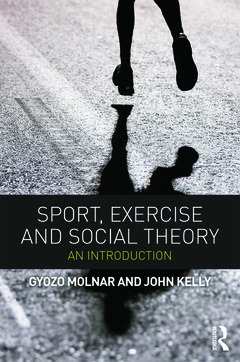Description
Sport, Exercise and Social Theory
An Introduction
Authors: Molnar Gyozo, Kelly John
Language: English
Keywords
sport sociology; sociology of sport; sport and society; sociological imagination; functionalist theory; neo-marxist; figurational sociology; feminist theory; post-modern; cultural studies; Young Men; Exercise Motor Control; Contemporary Society; Brand UK; UK Military; UK History; Vice Versa; UK Child; Female Bodybuilder; Symbolic Interaction Accounts; Ford Fiesta; Salt Lake City Winter Olympics; Symbolic Interaction; Symbolic Interaction Lens; Boxing Gloves; Sociology Module; Process Sociology; Sportisation Process; Fox Hunting; Cultural Studies Theorists; General UK Population; Exercise Sciences Students; Marx's Base Superstructure Model; Mass Consent; Symbolic Interaction Work
64.97 €
In Print (Delivery period: 14 days).
Add to cartPublication date: 10-2012
Support: Print on demand
178.41 €
In Print (Delivery period: 14 days).
Add to cartPublication date: 10-2012
Support: Print on demand
Description
/li>Contents
/li>Readership
/li>Biography
/li>
- Why are sport and exercise important?
- What can the study of sport and exercise tell us about wider society?
- Who holds the power in creating contemporary sport and exercise discourses?
It is impossible to properly understand the role that sport and exercise play in contemporary society without knowing a little social theory. It is social theory that provides the vocabulary for our study of society, that helps us ask the right critical questions and that encourages us to look for the (real) story behind sport and exercise.
Sport, Exercise and Social Theory is a concise and engaging introduction to the key theories that underpin the study of sport, exercise and society, including feminism, post-modernism, (Neo-)Marxism and the sociological imagination. Using vivid examples and descriptions of sport-related events and exercise practices, the book explains why social theories are important as well as how to use them, giving students the tools to navigate with confidence through any course in the sociology of sport and exercise.
This book shows how theory can be used to debunk many of our traditional assumptions about sport and exercise and how they can be a useful window through which to observe wider society. Designed to be used by students who have never studied sociology before, and including a whole chapter on the practical application of social theory to their own study, it provides training in critical thinking and helps students to develop intellectual skills which will serve them throughout their professional and personal lives.
1. Introduction 2. C. Wright Mills and the Sociological Imagination 3. Functionalist Perspectives 4. Marxist Perspectives 5. Cultural Studies Perspectives 6. Symbolic Interaction Perspectives 7. Process-Sociology: The Civilising Process 8. Feminist Perspectives 9. Post-modern Perspectives 10. A Guide to the Craft of Sociology
Gyozo Molnar is Senior Lecturer in Sport Studies in the Institute of Sport and Exercise Science at the University of Worcester, UK. His current publications and research revolve around migration, football, globalization, national identity, the Olympics and sport-related role exit.
John Kelly is Lecturer in Sport and Recreation Business Management in theMoray House School of Education at Edinburgh University, UK. His research interests revolve around ethnicity, sectarianism, nationalism, militarism and sport.




